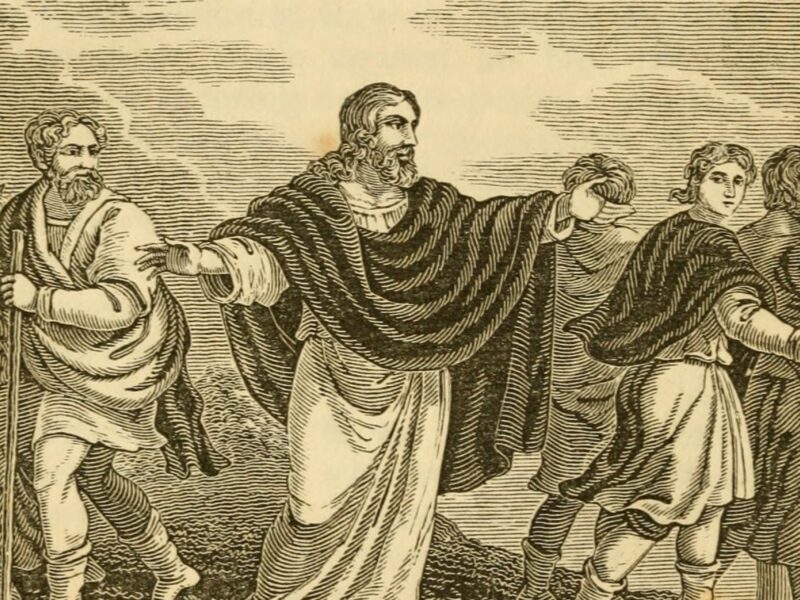
True Depths of Philosophy
Sixth Sunday in Ordinary Time (A) | Fr Dominic White says the Gospel challenges us to understand the true depths of its philosophy, namely, of the Cross. 
Who do you find convincing?
I suspect the simplest answer would be, ‘Someone who sounds truthful.’ Not just not lying, but understanding rather than just knowing: walking the walk, not just talking the talk. Tone of voice matters as much as words, or more: if I sound pompous, or condescending, or just “saying the right thing”, then why should you believe me?
I think this may be a good starting point for understanding those strange words of Jesus in today’s Gospel, “I tell you solemnly, till heaven and earth disappear, not one dot, not one little stroke, shall disappear from the Law until its purpose is achieved.” The dots and strokes are the vowels of the Hebrew alphabet, the language of the Jewish scriptures, the Old Testament. The basis of Hebrew writing is just the consonants – but the vowels are needed for the words to make a sound. Also changing the vowels changes the meaning. Normally people would have remembered the vowels, but they were sometimes written in for beginners like me. Furthermore, the Jewish Scriptures, in which the Law is contained, are to this day sung in Jewish services. Reading was not enough – singing is needed for the full sound to be present. And really to sing, we have to believe in and be truly present to the words and the music. We need to be open to their deepest meaning. We need to let the words abide in us, disturb us, change us.
So this is not Jesus imposing the Jewish Law on the first Christians in all its details. It is Jesus taking us to the heart of the Law of God, the observances of which (such as abstaining from pork) were signs only relevant to a particular time and place. Jesus confronts us with the terribly destructive effect unjust anger can have. He challenges us with how we look at others: do we look at them in love, rejoicing that this child of God exists, or do we ultimately see them as simply for our use – sexually or otherwise? Do we take with our hands what we need, or whatever this consumer that is me happens to want at this particular moment? Is our yes really yes and our no really no?
This is obviously a huge challenge, and Jesus uses deliberately shocking language about tearing our eye out or cutting off our hand if they cause us to sin. And of course, often we’re thoughtless rather than malicious. But that’s the point – just because my anger was thoughtless because I was in a bad mood about something else doesn’t mean it caused any less damage to the person I yelled at. Again, we might think about things, but just be too quick – talking the talk rather than walking the walk.
Perhaps this is why St. Paul, in today’s second reading, is critical of the wisdom of his age. They had their philosophers just like we do. Some of them, known as Sophists (as in sophisticated) taught people to be smart, to win every argument, but with little concern for whether they were actually right. In the verses just before, Paul says to the people of Corinth – a smart, upwardly mobile place – that when he came to them he did not use “lofty words or wisdom” to proclaim the mystery of God, but rather decided “to know nothing among you except Jesus Christ, and him crucified”. It would have been too easy for Paul to compare the cross of Christ with the cross symbol in the Timaeus, a philosophical dialogue by the great Greek philosopher Plato. The Corinthians would have “got” the cross immediately: it was the reconciliation of stillness and movement, the reconciliation of opposites in general. True, but not true enough for the mother who has lost a child or the refugees freezing in the snow. When we have listened to such hard truths, heard the full, honest sound and let it disturb us, prayed over it, then we can understand the true depths of philosophy. We can think, and speak the truth.
Ecclesiasticus 15:16-21 | 1 Corinthians 2:6-10 | Matthew 5:17-37
Photograph by Fr Lawrence Lew OP.
Sorry, the comment form is closed at this time.



A Website Visitor
Thank you. Deep and very beautiful ideas, magnificently expressed. A brother of yours from León, Spain
A Website Visitor
Thank you for an excellent and unsophisticated commentary on Sunday’s gospel. Much appreciated. Sr. Maureen, Fukushima, Japan
A Website Visitor
Thank you for wonderful reflections. I get lots of ideas for my homilies at parish. God bless you and may always bring new vocations to monastic and priestly life. In prayer Fr. Eugene
A Website Visitor
Thank you Brother – disturbing when you see things in a new light. A brother in West Australia